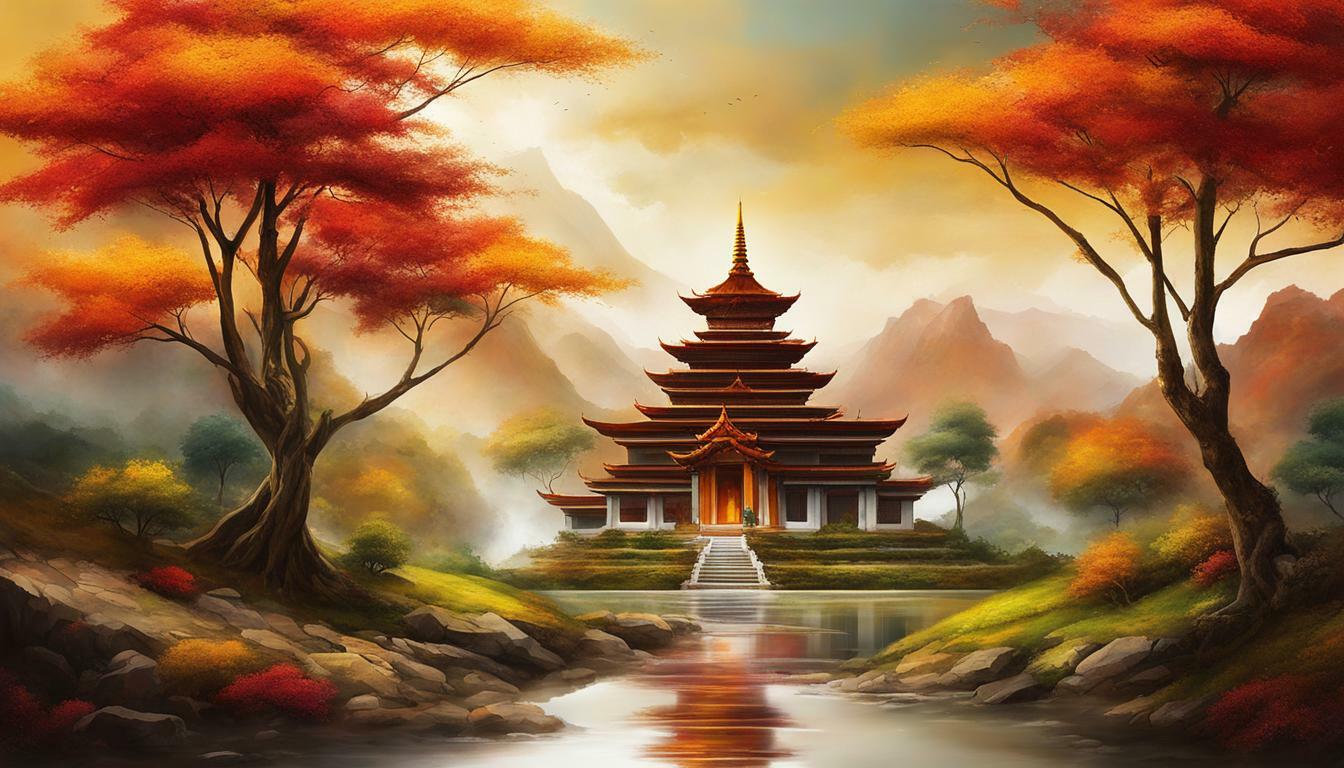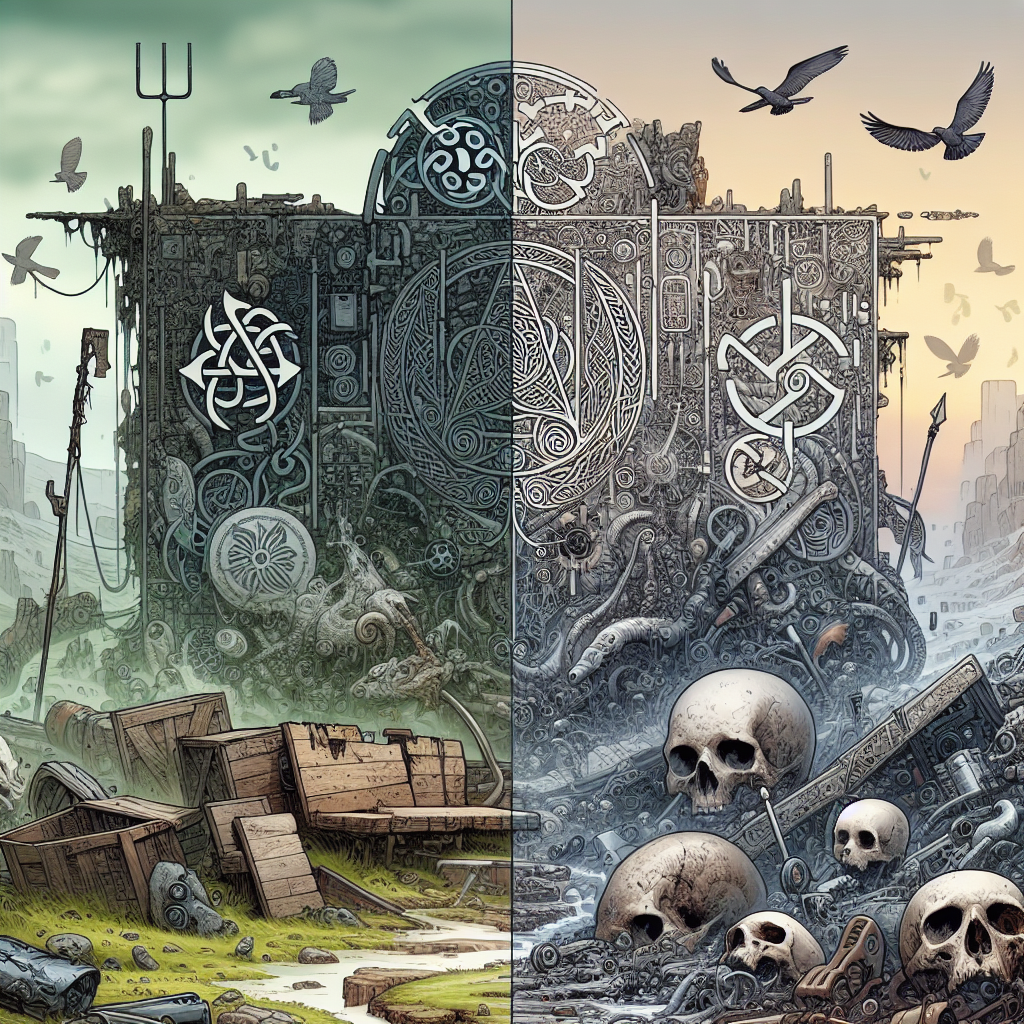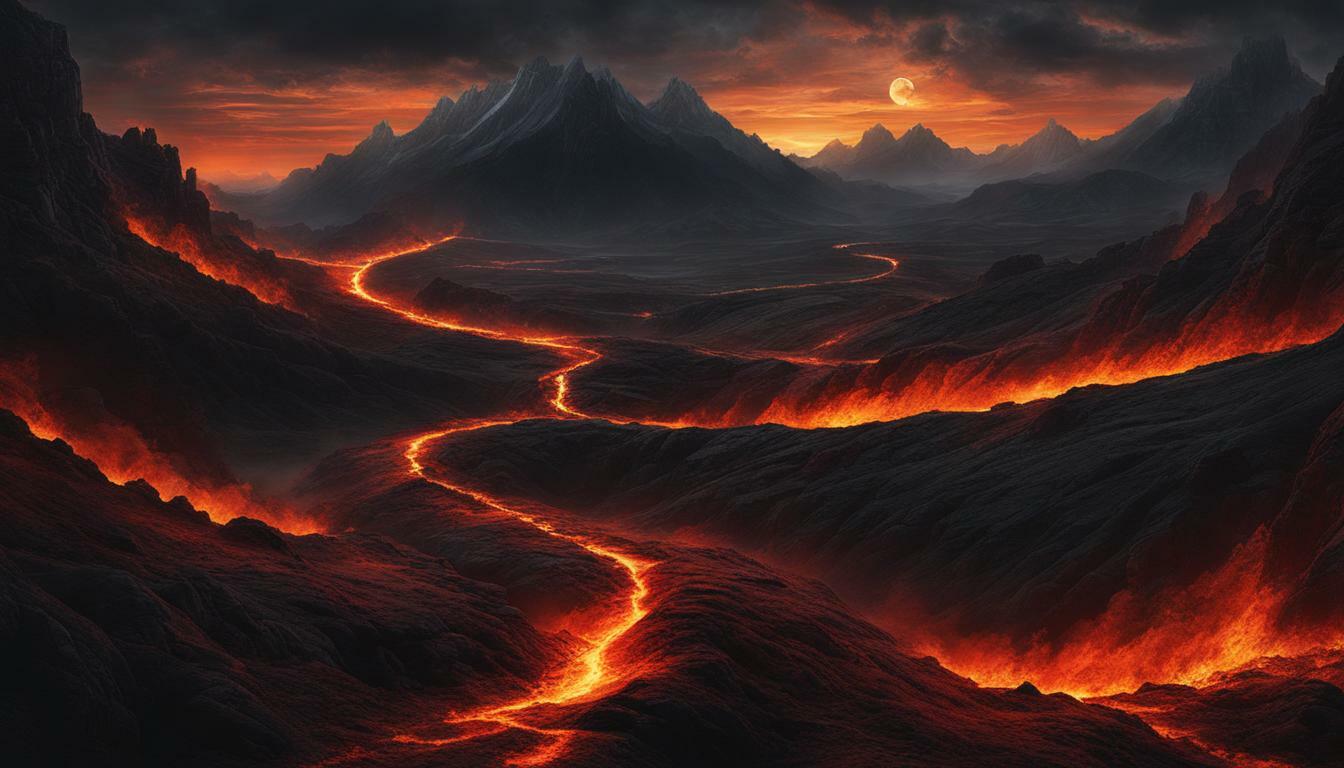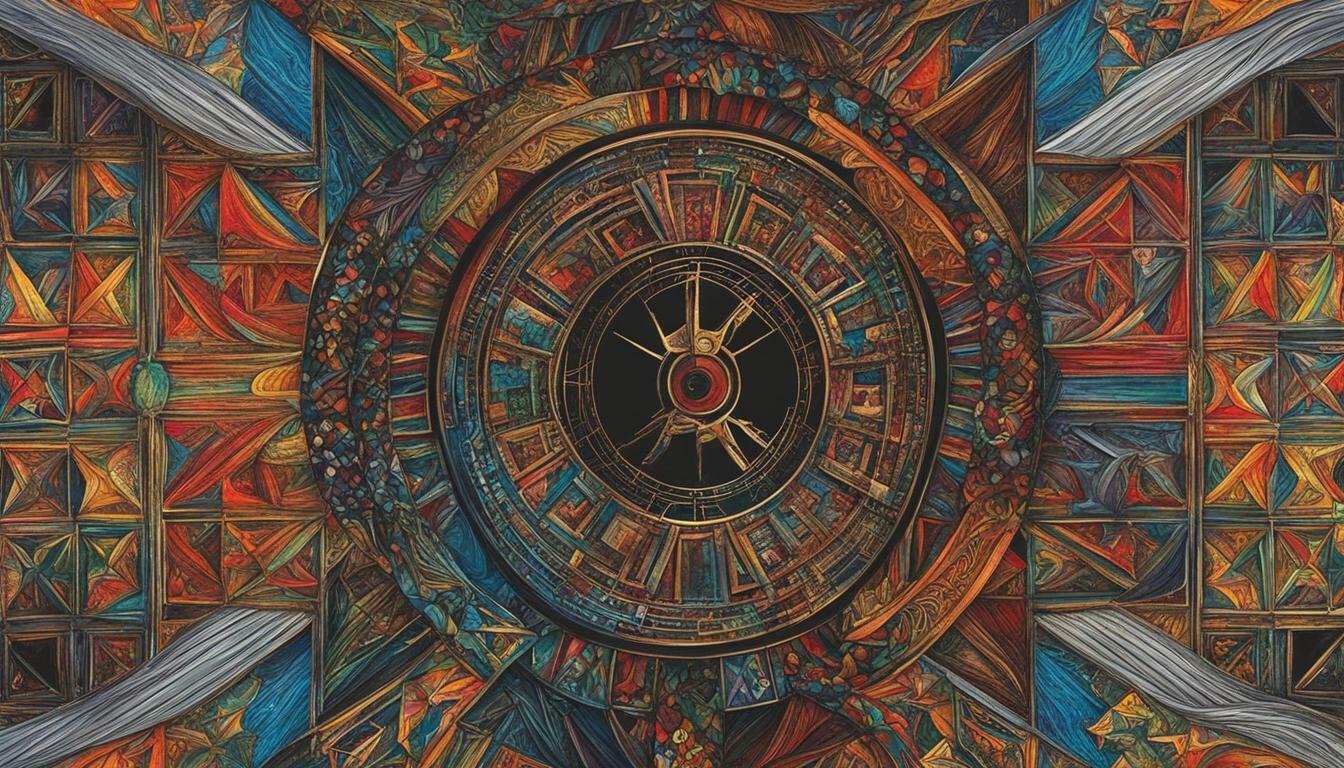The beliefs and concepts of Buddhist Pure Land and Christian Heaven differ greatly, providing distinct perspectives on the afterlife and spiritual realms. While both traditions share the notion of an elevated realm beyond earthly existence, they have unique interpretations of location, purpose, lifespan, relationship, and the belief in a creator God.
Key Takeaways:
- Buddhist Pure Lands are considered pure realms beyond cyclic existence, facilitating purity and transcendence of good and evil.
- Christian Heaven is often depicted as an ethereal realm above the earth, where the righteous go after death.
- Purpose in Pure Land Buddhism is to attain enlightenment and return to guide others towards enlightenment, while Christian Heaven aims for eternal bliss and worship in the presence of God.
- Inhabitants of Brahma heavens in Buddhism have long but finite lifespans and are subject to rebirth, while Pure Lands are eternal and their inhabitants are freed from karmic rebirth.
- In Pure Lands, all inhabitants are trained to be equally and perfectly enlightened, whereas Christian Heaven entails worship and servitude towards God.
- Buddhism does not endorse the belief in an omnipotent, omniscient, and omni-benevolent creator god, whereas Christian Heaven is often associated with the belief in a divine creator.
Location and Existence
In Pure Land Buddhism, the idea of a Pure Land transcends the boundaries of cyclic existence, while Christian belief places Heaven in an ethereal realm above the earth. Pure Lands are seen as pure realms beyond the cycle of birth and death, where beings can attain purity and transcendence of good and evil. These Pure Lands are believed to be created by fully enlightened Buddhas, such as Amitabha Buddha in the case of the Western Pure Land. They are depicted as idyllic, serene, and devoid of suffering, serving as a conducive environment for spiritual growth and attainment of enlightenment.
On the other hand, Christian Heaven is often described as an otherworldly realm located above the physical earth. It is considered a place where the righteous go after death to be in the presence of God and experience eternal bliss. Heaven is portrayed as a realm of divine light, peace, and harmony, where believers are free from pain, suffering, and sin.
While both Pure Land Buddhism and Christian belief hold the concept of an afterlife realm, the specific ideas about the nature and location of these realms differ based on their respective religious traditions.
| Buddhist Pure Land | Christian Heaven |
|---|---|
| Pure realms beyond cyclic existence | Ethereal realm above the earth |
| Created by fully enlightened Buddhas | Associated with the belief in a divine creator |
| Facilitates purity and transcendence of good and evil | A place of eternal bliss and worship |
Purpose and Goals in Pure Land Buddhism and Christian Heaven
The purpose and goals of seeking birth in a Pure Land in Buddhism and going to Heaven in Christianity differ significantly, reflecting distinct spiritual aspirations.
In Pure Land Buddhism, the primary purpose of seeking birth in a Pure Land is to learn how to become a perfect Bodhisattva and attain enlightenment. The ultimate goal is to return to Samsara, including the hells, in order to guide other beings towards enlightenment. This reflects the compassionate nature of Buddhism, where the focus is not only on one’s own liberation but also on helping others achieve liberation from suffering.
On the other hand, in Christian belief, the purpose of going to Heaven is to be in the presence of God and to experience eternal bliss and worship. The goal is to be united with God and to participate in the divine presence. This reflects the emphasis on devotion and worship in Christianity, where the aim is to be in the eternal presence of a divine creator.
These differing purposes and goals highlight the distinct spiritual paths and aspirations within Pure Land Buddhism and Christianity. While Pure Land Buddhism seeks to attain enlightenment and guide others towards liberation, Christianity focuses on union with God and the experience of eternal bliss in His presence.
Lifespan and Rebirth
The beliefs regarding lifespan and rebirth in Pure Land Buddhism and Christian Heaven differ significantly. In Buddhism, the emphasis is placed on the temporary nature of existence in the Brahma heavens and the cycle of rebirth in Samsara. While the inhabitants of Brahma heavens enjoy immensely long lifespans, they are still subject to the cycle of rebirth once their positive karma is depleted.
On the other hand, Pure Lands in Buddhism are believed to be truly eternal. Inhabitants of Pure Lands are no longer subject to the karmic cycle of rebirth in Samsara. They have attained enlightenment and are liberated from the suffering and impermanence of worldly existence. Pure Lands are considered pure realms where individuals can continue their spiritual practice and journey towards higher levels of enlightenment.
This stark contrast in beliefs reflects the different understandings of the ultimate nature of reality and the goal of spiritual attainment within these traditions. While Buddhism focuses on the liberation from cyclic existence and the realization of enlightenment, Christian Heaven is often associated with the belief in a divine creator and the eternal blissful presence of God.
These varying beliefs highlight the diversity and richness of religious traditions and their interpretations of the afterlife. It is important to approach these beliefs with an open mind and respect for the different perspectives held by individuals within Pure Land Buddhism and Christianity.
| Buddhist Pure Land | Christian Heaven |
|---|---|
| Inhabitants have very long but finite lifespans | Lifelong existence in the presence of God |
| Subject to the cycle of rebirth in Samsara | Freedom from the cycle of rebirth and suffering |
| Pursuit of enlightenment and return to Samsara to guide others | Experiencing eternal bliss and worship |
| Principal-Teachers-Students relationship in Pure Lands | Worship and servitude towards God |
Relationship and Role
The relationship and role of individuals in Pure Land Buddhism and Christian Heaven diverge significantly, with Buddhism emphasizing learning and enlightenment among inhabitants of Pure Lands, while Christian Heaven is commonly associated with worship and servitude towards God.
In Pure Land Buddhism, the relationship between the inhabitants of a Pure Land is that of Principal-Teachers-Students. All beings residing in the Pure Land are considered to be on the path to perfect enlightenment, and they are trained equally to achieve this state. The emphasis is on learning and practicing the Dharma, with the ultimate goal of guiding other beings towards enlightenment. This relationship is characterized by mutual support, cooperation, and the aspiration to attain enlightenment together.
On the other hand, Christian Heaven is often seen as a place of worship and servitude towards God. The relationship between individuals in Christian Heaven is centered around adoration, praise, and surrender to the divine. The inhabitants of Christian Heaven are believed to be in the presence of God, experiencing eternal bliss and engaging in continuous worship. This relationship is characterized by reverence, gratitude, and a sense of fulfillment in being in the divine presence.
Table 1: Comparison of Relationship and Role in Pure Land Buddhism and Christian Heaven
| Pure Land Buddhism | Christian Heaven |
|---|---|
| Principal-Teachers-Students | Worship and servitude towards God |
| Focus on learning and enlightenment | Focus on worship and adoration |
| Mutual support and cooperation | Reverence and gratitude towards God |
In summary, the relationship and role of individuals in Pure Land Buddhism and Christian Heaven reflect the distinct beliefs and practices of these religious traditions. While Pure Land Buddhism emphasizes the pursuit of enlightenment and the collective effort towards guiding others, Christian Heaven is characterized by worship, devotion, and surrender to the divine. These differences highlight the diversity of spiritual paths and the unique perspectives offered by different religious traditions.
Conclusion
In conclusion, the beliefs and concepts of Buddhist Pure Land and Christian Heaven present contrasting perspectives on the afterlife and spiritual realms, as seen in their views on location, purpose, lifespan, relationship, and the belief in a divine creator.
Buddhist Pure Land is viewed as a pure realm beyond cyclic existence, facilitating purity and transcendence of good and evil. In contrast, Christian Heaven is often depicted as an ethereal realm above the earth where the righteous go after death.
The purpose of seeking birth in a Pure Land in Pure Land Buddhism is to become a perfect Bodhisattva and attain enlightenment to guide others towards enlightenment. Conversely, the purpose of going to Christian Heaven is to be in the presence of God, experience eternal bliss, and engage in worship.
Lifespan and rebirth also differ between the two beliefs. In the Brahma heavens of Buddhism, inhabitants have long lifespans but are ultimately subject to rebirth in Samsara. In Pure Lands, however, the inhabitants are considered eternal and freed from karmic rebirth in Samsara.
The relationship and role within these spiritual realms also diverge. In Brahma heavens, life lacks purpose unless one realizes the need for learning and practicing the Dharma. The relationship in Pure Lands is that of Principal-Teachers-Students, where all inhabitants are trained to be equally and perfectly enlightened. On the other hand, Christian Heaven is associated with worship and servitude towards God.
Furthermore, the belief in a divine creator sets Buddhism and Christianity apart. Buddhism does not endorse the belief in an omnipotent, omniscient, and omni-benevolent creator God. Instead, Pure Lands are believed to be created by fully enlightened Buddhas, while Christian Heaven is often associated with the belief in a divine creator.
It is important to note that these differences are based on the interpretations and beliefs within Pure Land Buddhism and Christianity and may not represent the views of all individuals within these traditions.
FAQ
What are the main differences between Buddhist Pure Land and Christian Heaven?
The main differences between Buddhist Pure Land and Christian Heaven are as follows:
Where are Buddhist Pure Lands and Christian Heaven believed to exist?
Buddhist Pure Lands are believed to be beyond cyclic existence, while Christian Heaven is often depicted as existing in an ethereal realm above the earth.
What is the purpose of seeking birth in a Pure Land in Buddhism and going to Heaven in Christianity?
In Pure Land Buddhism, the purpose is to learn how to become a perfect Bodhisattva and attain enlightenment, in order to guide other beings towards enlightenment in Samsara. In Christianity, the purpose is to be in the presence of God and experience eternal bliss and worship.
Are the inhabitants of Pure Lands and Heaven subject to rebirth?
In the Brahma heavens of Buddhism, the inhabitants have long lifespans but are still subject to rebirth in Samsara once their positive karma is depleted. In contrast, Pure Lands are considered truly eternal, and their inhabitants are no longer subject to karmic rebirth in Samsara.
What is the relationship between the inhabitants of Pure Lands and Heaven?
In Brahma heavens, life is generally aimless unless one realizes the need to learn and practice the Dharma. In Pure Lands, the relationship is that of Principal-Teachers-Students, where all inhabitants are trained to be equally and perfectly enlightened. In Christian Heaven, the relationship is typically seen as one of worship and servitude towards God.
Is there a belief in a creator God in Pure Land Buddhism and Christianity?
Buddhism does not endorse the belief in an omnipotent, omniscient, and omni-benevolent creator god. Pure Lands are believed to be created by fully enlightened Buddhas. Christian Heaven, on the other hand, is often associated with the belief in a divine creator.



